- Home
- Alice Munro
Friend of My Youth Page 2
Friend of My Youth Read online
Page 2
No cake, no new clothes, no wedding trip, no congratulations. Just a shameful hurry-up visit to the manse. Some people, seeing the names in the paper, thought the editor must have got the sisters mixed up. They thought it must be Flora. A hurry-up wedding for Flora! But no—it was Flora who pressed Robert’s suit—it must have been—and got Ellie out of bed and washed her and made her presentable. It would have been Flora who picked one geranium from the window plant and pinned it to her sister’s dress. And Ellie hadn’t torn it out. Ellie was meek now, no longer flailing or crying. She let Flora fix her up, she let herself be married, she was never wild from that day on.
Flora had the house divided. She herself helped Robert build the necessary partitions. The baby was carried full term—nobody even pretended that it was early—but it was born dead after a long, tearing labor. Perhaps Ellie had damaged it when she jumped from the barn beam and rolled in the snow and beat on herself. Even if she hadn’t done that, people would have expected something to go wrong, with that child or maybe one that came later. God dealt out punishment for hurry-up marriages—not just Presbyterians but almost everybody else believed that. God rewarded lust with dead babies, idiots, harelips and withered limbs and clubfeet.
In this case the punishment continued. Ellie had one miscarriage after another, then another stillbirth and more miscarriages. She was constantly pregnant, and the pregnancies were full of vomiting fits that lasted for days, headaches, cramps, dizzy spells. The miscarriages were as agonizing as full-term births. Ellie could not do her own work. She walked around holding on to chairs. Her numb silence passed off, and she became a complainer. If anybody came to visit, she would talk about the peculiarities of her headaches or describe her latest fainting fit, or even—in front of men, in front of unmarried girls or children—go into bloody detail about what Flora called her “disappointments.” When people changed the subject or dragged the children away, she turned sullen. She demanded new medicine, reviled the doctor, nagged Flora. She accused Flora of washing the dishes with a great clang and clatter, out of spite, of pulling her—Elite’s—hair when she combed it out, of stingily substituting water-and-molasses for her real medicine. No matter what she said, Flora soothed her. Everybody who came into the house had some story of that kind to tell. Flora said, “Where’s my little girl, then? Where’s my Ellie? This isn’t my Ellie, this is some crosspatch got in here in place of her!”
In the winter evenings after she came in from helping Robert with the barn chores, Flora would wash and change her clothes and go next door to read Ellie to sleep. My mother might invite herself along, taking whatever sewing she was doing, on some item of her trousseau. Ellie’s bed was set up in the big dining room, where there was a gas lamp over the table. My mother sat on one side of the table, sewing, and Flora sat on the other side, reading aloud. Sometimes Ellie said, “I can’t hear you.” Or if Flora paused for a little rest Ellie said, “I’m not asleep yet.”
What did Flora read? Stories about Scottish life—not classics. Stories about urchins and comic grandmothers. The only title my mother could remember was Wee Macgregor. She could not follow the stories very well, or laugh when Flora laughed and Ellie gave a whimper, because so much was in Scots dialect or read with that thick accent. She was surprised that Flora could do it—it wasn’t the way Flora ordinarily talked, at all.
(But wouldn’t it be the way Robert talked? Perhaps that is why my mother never reports anything that Robert said, never has him contributing to the scene. He must have been there, he must have been sitting there in the room. They would only heat the main room of the house. I see him black-haired, heavy-shouldered, with the strength of a plow horse, and the same kind of sombre, shackled beauty.)
Then Flora would say, “That’s all of that for tonight.” She would pick up another book, an old book written by some preacher of their faith. There was in it such stuff as my mother had never heard. What stuff? She couldn’t say. All the stuff that was in their monstrous old religion. That put Ellie to sleep, or made her pretend she was asleep, after a couple of pages.
All that configuration of the elect and the damned, my mother must have meant—all the arguments about the illusion and necessity of free will. Doom and slippery redemption. The torturing, defeating, but for some minds irresistible pileup of interlocking and contradictory notions. My mother could resist it. Her faith was easy, her spirits at that time robust. Ideas were not what she was curious about, ever.
But what sort of thing was that, she asked (silently), to read to a dying woman? This was the nearest she got to criticizing Flora.
The answer—that it was the only thing, if you believed it—never seemed to have occurred to her.
By spring a nurse had arrived. That was the way things were done then. People died at home, and a nurse came in to manage it.
The nurse’s name was Audrey Atkinson. She was a stout woman with corsets as stiff as barrel hoops, marcelled hair the color of brass candlesticks, a mouth shaped by lipstick beyond its own stingy outlines. She drove a car into the yard—her own car, a dark-green coupé, shiny and smart. News of Audrey Atkinson and her car spread quickly. Questions were asked. Where did she get the money? Had some rich fool altered his will on her behalf? Had she exercised influence? Or simply helped herself to a stash of bills under the mattress? How was she to be trusted?
Hers was the first car ever to sit in the Grieveses’ yard overnight.
Audrey Atkinson said that she had never been called out to tend a case in so primitive a house. It was beyond her, she said, how people could live in such a way.
“It’s not that they’re poor, even,” she said to my mother. “It isn’t, is it? That I could understand. Or it’s not even their religion. So what is it? They do not care!”
She tried at first to cozy up to my mother, as if they would be natural allies in this benighted place. She spoke as if they were around the same age—both stylish, intelligent women who liked a good time and had modern ideas. She offered to teach my mother to drive the car. She offered her cigarettes. My mother was more tempted by the idea of learning to drive than she was by the cigarettes. But she said no, she would wait for her husband to teach her. Audrey Atkinson raised her pinkish-orange eyebrows at my mother behind Flora’s back, and my mother was furious. She disliked the nurse far more than Flora did.
“I knew what she was like and Flora didn’t,” my mother said. She meant that she caught a whiff of a cheap life, maybe even of drinking establishments and unsavory men, of hard bargains, which Flora was too unworldly to notice.
Flora started into the great housecleaning again. She had the curtains spread out on stretchers, she beat the rugs on the line, she leapt up on the stepladder to attack the dust on the molding. But she was impeded all the time by Nurse Atkinson’s complaining.
“I wondered if we could have a little less of the running and clattering?” said Nurse Atkinson with offensive politeness. “I only ask for my patient’s sake.” She always spoke of Ellie as “my patient” and pretended that she was the only one to protect her and compel respect. But she was not so respectful of Ellie herself. “Allee-oop,” she would say, dragging the poor creature up on her pillows. And she told Ellie she was not going to stand for fretting and whimpering. “You don’t do yourself any good that way,” she said. “And you certainly don’t make me come any quicker. What you just as well might do is learn to control yourself.” She exclaimed at Ellie’s bedsores in a scolding way, as if they were a further disgrace of the house. She demanded lotions, ointments, expensive soap—most of them, no doubt, to protect her own skin, which she claimed suffered from the hard water. (How could it be hard, my mother asked her—sticking up for the household when nobody else would—how could it be hard when it came straight from the rain barrel?)
Nurse Atkinson wanted cream, too—she said that they should hold some back, not sell it all to the creamery. She wanted to make nourishing soups and puddings for her patient. She did make puddings, and jellies, f
rom packaged mixes such as had never before entered this house. My mother was convinced that she ate them all herself.
Flora still read to Ellie, but now it was only short bits from the Bible. When she finished and stood up, Ellie tried to cling to her. Ellie wept, sometimes she made ridiculous complaints. She said there was a horned cow outside, trying to get into the room and kill her.
“They often get some kind of idea like that,” Nurse Atkinson said. “You mustn’t give in to her or she won’t let you go day or night. That’s what they’re like, they only think about themselves. Now, when I’m here alone with her, she behaves herself quite nice. I don’t have any trouble at all. But after you been in here I have trouble all over again because she sees you and she gets upset. You don’t want to make my job harder for me, do you? I mean, you brought me here to take charge, didn’t you?”
“Ellie, now, Ellie dear, I must go,” said Flora, and to the nurse she said, “I understand. I do understand that you have to be in charge and I admire you, I admire you for your work. In your work you have to have so much patience and kindness.”
My mother wondered at this—was Flora really so blinded, or did she hope by this undeserved praise to exhort Nurse Atkinson to the patience and kindness that she didn’t have? Nurse Atkinson was too thick-skinned and self-approving for any trick like that to work.
“It is a hard job, all right, and not many can do it,” she said. “It’s not like those nurses in the hospital, where they got everything laid out for them.” She had no time for more conversation—she was trying to bring in “Make-Believe Ballroom” on her battery radio.
My mother was busy with the final exams and the June exercises at the school. She was getting ready for her wedding in July. Friends came in cars and whisked her off to the dressmaker’s, to parties, to choose the invitations and order the cake. The lilacs came out, the evenings lengthened, the birds were back and nesting, my mother bloomed in everybody’s attention, about to set out on the deliciously solemn adventure of marriage. Her dress was to be appliquéd with silk roses, her veil held by a cap of seed pearls. She belonged to the first generation of young women who saved their money and paid for their own weddings—far fancier than their parents could have afforded.
On her last evening, the friend from the post office came to drive her away, with her clothes and her books and the things she had made for her trousseau and the gifts her pupils and others had given her. There was great fuss and laughter about getting everything loaded into the car. Flora came out and helped. This getting married is even more of a nuisance than I thought, said Flora, laughing. She gave my mother a dresser scarf, which she had crocheted in secret. Nurse Atkinson could not be shut out of an important occasion—she presented a spray bottle of cologne. Flora stood on the slope at the side of the house to wave goodbye. She had been invited to the wedding, but of course she had said she could not come, she could not “go out” at such a time. The last my mother ever saw of her was this solitary, energetically waving figure in her housecleaning apron and bandanna, on the green slope by the black-walled house, in the evening light.
“Well, maybe now she’ll get what she should’ve got the first time round,” the friend from the post office said. “Maybe now they’ll be able to get married. Is she too old to start a family? How old is she, anyway?”
My mother thought that this was a crude way of talking about Flora and replied that she didn’t know. But she had to admit to herself that she had been thinking the very same thing.
When she was married and settled in her own home, three hundred miles away, my mother got a letter from Flora. Ellie was dead. She had died firm in her faith, Flora said, and grateful for her release. Nurse Atkinson was staying on for a little while, until it was time for her to go off to her next case. This was late in the summer.
News of what happened next did not come from Flora. When she wrote at Christmas, she seemed to take for granted that information would have gone ahead of her.
“You have in all probability heard,” wrote Flora, “that Robert and Nurse Atkinson have been married. They are living on here, in Robert’s part of the house. They are fixing it up to suit themselves. It is very impolite of me to call her Nurse Atkinson, as I see I have done. I ought to have called her Audrey.”
Of course the post-office friend had written, and so had others. It was a great shock and scandal and a matter that excited the district—the wedding as secret and surprising as Robert’s first one had been (though surely not for the same reason), Nurse Atkinson permanently installed in the community, Flora losing out for the second time. Nobody had been aware of any courtship, and they asked how the woman could have enticed him. Did she promise children, lying about her age?
The surprises were not to stop with the wedding. The bride got down to business immediately with the “fixing up” that Flora mentioned. In came the electricity and then the telephone. Now Nurse Atkinson—she would always be called Nurse Atkinson—was heard on the party line lambasting painters and paperhangers and delivery services. She was having everything done over. She was buying an electric stove and putting in a bathroom, and who knew where the money was coming from? Was it all hers, got in her deathbed dealings, in shady bequests? Was it Robert’s, was he claiming his share? Ellie’s share, left to him and Nurse Atkinson to enjoy themselves with, the shameless pair?
All these improvements took place on one side of the house only. Flora’s side remained just as it was. No electric lights there, no fresh wallpaper or new venetian blinds. When the house was painted on the outside—cream with dark-green trim—Flora’s side was left bare. This strange open statement was greeted at first with pity and disapproval, then with less sympathy, as a sign of Flora’s stubbornness and eccentricity (she could have bought her own paint and made it look decent), and finally as a joke. People drove out of their way to see it.
There was always a dance given in the schoolhouse for a newly married couple. A cash collection—called “a purse of money”—was presented to them. Nurse Atkinson sent out word that she would not mind seeing this custom followed, even though it happened that the family she had married into was opposed to dancing. Some people thought it would be a disgrace to gratify her, a slap in the face to Flora. Others were too curious to hold back. They wanted to see how the newlyweds would behave. Would Robert dance? What sort of outfit would the bride show up in? They delayed a while, but finally the dance was held, and my mother got her report.
The bride wore the dress she had worn at her wedding, or so she said. But who would wear such a dress for a wedding at the manse? More than likely it was bought specially for her appearance at the dance. Pure-white satin with a sweetheart neckline, idiotically youthful. The groom was got up in a new dark-blue suit, and she had stuck a flower in his buttonhole. They were a sight. Her hair was freshly done to blind the eye with brassy reflections, and her face looked as if it would come off on a man’s jacket, should she lay it against his shoulder in the dancing. Of course she did dance. She danced with every man present except the groom, who sat scrunched into one of the school desks along the wall. She danced with every man present—they all claimed they had to do it, it was the custom—and then she dragged Robert out to receive the money and to thank everybody for their best wishes. To the ladies in the cloakroom she even hinted that she was feeling unwell, for the usual newlywed reason. Nobody believed her, and indeed nothing ever came of this hope, if she really had it. Some of the women thought that she was lying to them out of malice, insulting them, making them out to be so credulous. But nobody challenged her, nobody was rude to her—maybe because it was plain that she could summon a rudeness of her own to knock anybody flat.
Flora was not present at the dance.
“My sister-in-law is not a dancer,” said Nurse Atkinson. “She is stuck in the olden times.” She invited them to laugh at Flora, whom she always called her sister-in-law, though she had no right to do so.
My mother wrote a letter to Flora after heari
ng about all these things. Being removed from the scene, and perhaps in a flurry of importance due to her own newly married state, she may have lost sight of the kind of person she was writing to. She offered sympathy and showed outrage, and said blunt disparaging things about the woman who had—as my mother saw it—dealt Flora such a blow. Back came a letter from Flora saying that she did not know where my mother had been getting her information, but that it seemed she had misunderstood, or listened to malicious people, or jumped to unjustified conclusions. What happened in Flora’s family was nobody else’s business, and certainly nobody needed to feel sorry for her or angry on her behalf. Flora said that she was happy and satisfied in her life, as she always had been, and she did not interfere with what others did or wanted, because such things did not concern her. She wished my mother all happiness in her marriage and hoped that she would soon be too busy with her own responsibilities to worry about the lives of people that she used to know.
This well-written letter cut my mother, as she said, to the quick. She and Flora stopped corresponding. My mother did become busy with her own life and finally a prisoner in it.
But she thought about Flora. In later years, when she sometimes talked about the things she might have been, or done, she would say, “If I could have been a writer—I do think I could have been; I could have been a writer—then I would have written the story of Flora’s life. And do you know what I would have called it? ‘The Maiden Lady.’ ”
The Maiden Lady. She said these words in a solemn and sentimental tone of voice that I had no use for. I knew, or thought I knew, exactly the value she found in them. The stateliness and mystery. The hint of derision turning to reverence. I was fifteen or sixteen years old by that time, and I believed that I could see into my mother’s mind. I could see what she would do with Flora, what she had already done. She would make her into a noble figure, one who accepts defection, treachery, who forgives and stands aside, not once but twice. Never a moment of complaint. Flora goes about her cheerful labors, she cleans the house and shovels out the cow byre, she removes some bloody mess from her sister’s bed, and when at last the future seems to open up for her—Ellie will die and Robert will beg forgiveness and Flora will silence him with the proud gift of herself—it is time for Audrey Atkinson to drive into the yard and shut Flora out again, more inexplicably and thoroughly the second time than the first. She must endure the painting of the house, the electric lights, all the prosperous activity next door. “Make-Believe Ballroom,” “Amos ’n’ Andy.” No more Scottish comedies or ancient sermons. She must see them drive off to the dance—her old lover and that coldhearted, stupid, by no means beautiful woman in the white satin wedding dress. She is mocked. (And of course she has made over the farm to Ellie and Robert, of course he has inherited it, and now everything belongs to Audrey Atkinson.) The wicked flourish. But it is all right. It is all right—the elect are veiled in patience and humility and lighted by a certainty that events cannot disturb.

 Runaway
Runaway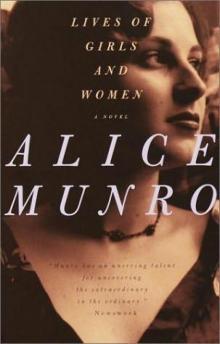 Lives of Girls and Women
Lives of Girls and Women Dance of the Happy Shades
Dance of the Happy Shades Open Secrets
Open Secrets Julieta (Movie Tie-in Edition)
Julieta (Movie Tie-in Edition)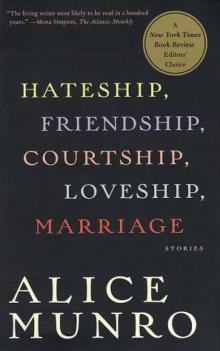 Hateship, Friendship, Courtship, Loveship, Marriage: Stories
Hateship, Friendship, Courtship, Loveship, Marriage: Stories Alice Munro's Best
Alice Munro's Best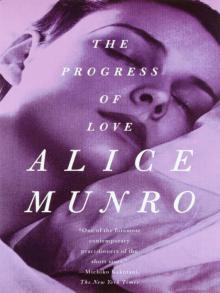 The Progress of Love
The Progress of Love Selected Stories
Selected Stories Away from Her
Away from Her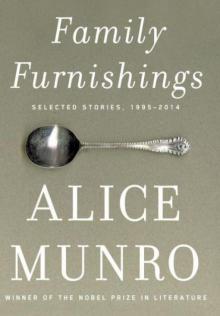 Family Furnishings
Family Furnishings Moons of Jupiter
Moons of Jupiter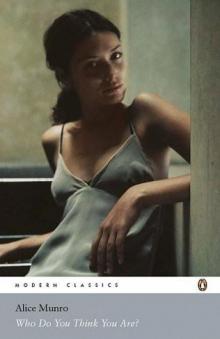 Who Do You Think You Are?
Who Do You Think You Are? Hateship, Friendship, Courtship, Loveship, Marriage
Hateship, Friendship, Courtship, Loveship, Marriage The Moons of Jupiter
The Moons of Jupiter Vintage Munro
Vintage Munro The Love of a Good Woman
The Love of a Good Woman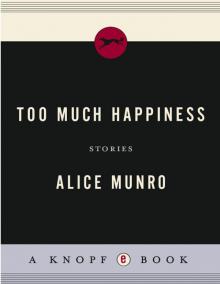 Too Much Happiness
Too Much Happiness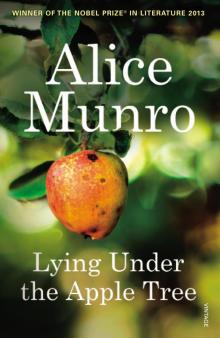 Lying Under the Apple Tree
Lying Under the Apple Tree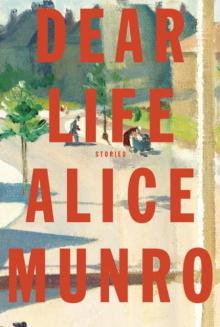 Dear Life
Dear Life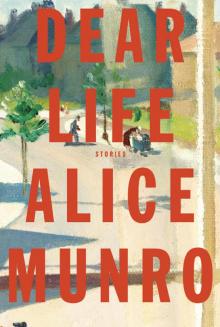 Dear Life: Stories
Dear Life: Stories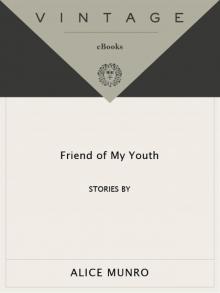 Friend of My Youth
Friend of My Youth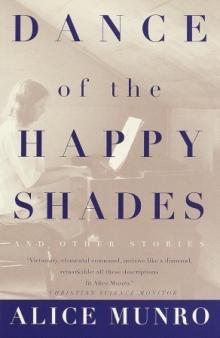 Dance of the Happy Shades: And Other Stories
Dance of the Happy Shades: And Other Stories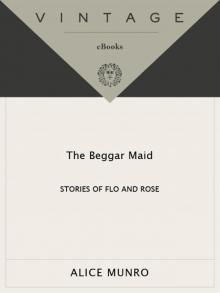 The Beggar Maid
The Beggar Maid